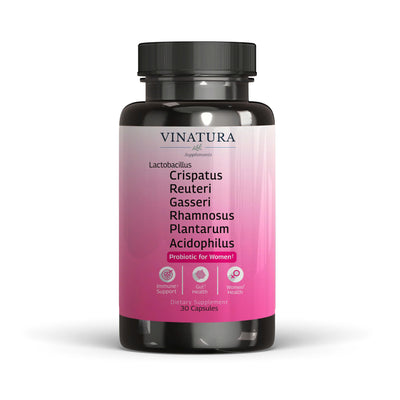
Does Acidophilus Cause Weight Gain?
Acidophilus, scientifically known as Lactobacillus acidophilus, is a strain of beneficial bacteria that naturally exists within the human body, specifically in the digestive system. This remarkable microorganism falls under the category of probiotics, denoting live bacteria that offer numerous health advantages when ingested in sufficient quantities. Acidophilus is responsible for producing lactic acid, which helps establish an acidic environment in the intestines. In this article, we will address the question Does Acidophilus cause weight gain or not and explore the effects of acidophilus on body weight.
Before exploring further, please read the disclaimer located at the end of this webpage.
Does Acidophilus Cause Weight Gain?
A study was conducted to assess the effects of probiotics containing Lactobacillus on the weight of both humans and animals.
They have analyzed and incorporated 17 randomized controlled trials (RCTs) involving human participants, 51 studies involving farm animals, and 14 experimental models. The results showed that the administration of Lactobacillus acidophilus resulted in noteworthy weight gain in both humans and animals. [1]
In addition, Lactobacillus fermentum and Lactobacillus ingluviei have been associated with weight gain in animals. Lactobacillus plantarum is associated with weight loss in animals, while Lactobacillus gasseri is associated with weight loss in both obese humans and animals. [1].
You should choose the type of Lactobacillus that suits our needs and conditions because each type will have different functions and uses.

How Does Lactobacillus Acidophilus Cause Weight Gain?
Lactobacillus acidophilus is believed to influence weight gain through various mechanisms. These may include:
Enhanced digestion: A research showed that the inclusion of Lactobacillus acidophilus in milk has been found to decrease the release of hydrogen in the breath of individuals with lactose malabsorption. As a result, incorporating Lactobacillus acidophilus into milk as a dietary supplement proves advantageous by enhancing lactose digestion in humans. [15]
Breakdown of complex carbohydrates: Lactobacillus acidophilus produces enzymes that facilitate the breakdown of complex carbohydrates, including starches and fibers. This process enhances digestion and absorption of these vital nutrients, promoting optimal nutrient utilization.
Fermentation of dietary fibers: The fermentation process yields valuable byproducts, such as short-chain fatty acids, that supply energy to the colon's cell lining, promoting their overall health and well-being.
Modulation of gut microbiota: Lactobacillus acidophilus can produce antibacterial substances such as bacteriocin, hydrogen peroxide and organic acids. These substances help inhibit the growth of pathogenic bacteria and maintain a healthy bacterial balance in the intestines.
Maintenance of gut barrier function: Lactobacillus acidophilus plays a crucial role in supporting the integrity of the gut barrier, preventing the infiltration of harmful substances into the bloodstream. [2]

Using Lactobacillus Acidophilus For Weight Management
Lactobacillus acidophilus, along with other probiotics, has been the subject of research regarding its potential impact on weight management.
Although the research is still ongoing and no definitive conclusions have been reached, there are several potential ways in which Lactobacillus acidophilus may contribute to supporting weight management:
- Appetite regulation
- Fat metabolism: enhancing the breakdown of fats and increase fat oxidation. [4]
- Gut microbiota balance. [5]
- Immune modulation. [6]
- Production of enzymes: such as lactase, which helps break down lactose, the sugar found in milk and dairy products
- Maintenance of gut barrier function [2]
- Fermentation of dietary fibers.
- Breakdown of complex carbohydrates
On the market today, Acidophilus supplements come in various forms, such as tablets, capsules, and wafers. Certain probiotic supplements may include a blend of bacteria along with acidophilus, which can potentially benefit various body systems and health conditions.
Other Probiotics That Affect Weight Management
In addition to Lactobacillus acidophilus, numerous other probiotics have undergone study regarding their potential impact on weight management. Here are a few noteworthy examples:
- Lactobacillus gasseri. [10]
- Lactobacillus rhamnosus. [13]
- Lactobacillus plantarum. [14]
- Lactobacillus fermentum
- Bifidobacterium breve. [11]
- Bifidobacterium lactis
- Bifidobacterium longum
- Saccharomyces boulardii. [12]
- Akkermansia muciniphila
Conclusion
Lactobacillus acidophilus provides numerous benefits due to its ability to support a healthy gut microbiome and digestive system. It helps maintain the balance of beneficial bacteria, supports nutrient absorption, strengthens the immune system, and may alleviate certain digestive issues. Although Lactobacillus acidophilus may contribute to weight gain, it is important to consider that many other factors, such as diet and lifestyle, play a significant role in body weight. Further research is needed to fully understand the effects of Acidophilus on weight management. However, incorporating probiotics into your diet can have numerous benefits for overall health and well-being.
References
- [1] Million, M., Angelakis, E., Paul, M., Fabrice Armougom, Leibovici, L., & Didier Raoult. (2012). Comparative meta-analysis of the effect of Lactobacillus species on weight gain in humans and animals. Microbial Pathogenesis, 53(2), 100–108. https://doi.org/10.1016/j.micpath.2012.05.007
- [2] Rao, K., & Samak, G. (2013). Protection and Restitution of Gut Barrier by Probiotics: Nutritio...: Ingenta Connect. Ingentaconnect.com. https://www.ingentaconnect.com/content/ben/cnf/2013/00000009/00000002/art00004
- [3] Lactobacillus acidophilus: Characterization of the Species and Application in Food Production. (2014). Critical Reviews in Food Science and Nutrition. https://www.tandfonline.com/doi/abs/10.1080/10408398.2011.621169
- [4] Tang, C., Jia, T., Sun, J., Fengting Lv, Lu, Z., & Lu, Y. (2021). Regulatory mechanisms of energy metabolism and inflammation in oleic acid‐treated HepG2 cells from Lactobacillus acidophilus NX2‐6 extract. Journal of Food Biochemistry, 45(10). https://doi.org/10.1111/jfbc.13925
- [5] Chen, M., Chen, C., Huang, Y., Tseng, C., Hsu, J., Yan Ren Lin, Fang, Y., Wu, M., & Liou, J. (2021). The efficacy of Lactobacillus acidophilus and rhamnosus in the reduction of bacterial load of Helicobacter pylori and modification of gut microbiota—a double‐blind, placebo‐controlled, randomized trial. Helicobacter, 26(6). https://doi.org/10.1111/hel.12857
- [6] Zhao, W., Liu, Y., Kwok, L., Cai, T., & Zhang, W. (2020). The immune regulatory role of Lactobacillus acidophilus: An updated meta-analysis of randomized controlled trials. Food Bioscience, 36, 100656–100656. https://doi.org/10.1016/j.fbio.2020.100656
- [7] Sieber, R., & Dietz, U.-T. (1998). Lactobacillus acidophilus and Yogurt in the Prevention and Therapy of Bacterial Vaginosis. International Dairy Journal, 8(7), 599–607. https://doi.org/10.1016/s0958-6946(98)00096-x
- [8] Wu, Z., & Pan, D. (2013). Structure and anti-inflammatory capacity of peptidoglycan from Lactobacillus acidophilus in RAW-264.7 cells. Carbohydrate Polymers, 96(2), 466–473. https://doi.org/10.1016/j.carbpol.2013.04.028
- [9] Probiotics for allergy prevention. (2015). Beneficial Microbes. https://www.wageningenacademic.com/doi/abs/10.3920/BM2015.0073
- [10] Kang, J., Yun, S., & Park, H.-O. (2010). Effects of Lactobacillus gasseri BNR17 on body weight and adipose tissue mass in diet-induced overweight rats. Journal of Microbiology, 48(5), 712–714. https://doi.org/10.1007/s12275-010-0363-8
- [11] Minami, J., Iwabuchi, N., Tanaka, M., Yamauchi, K., Xiao, J., Abe, F., & Naoki Sakane. (2018). Effects of Bifidobacterium breve B-3 on body fat reductions in pre-obese adults: a randomized, double-blind, placebo-controlled trial. BMFH, 37(3), 67–75. https://doi.org/10.12938/bmfh.18-001
- [12] Saccharomyces boulardii Administration Changes Gut Microbiota and Reduces Hepatic Steatosis, Low-Grade Inflammation, and Fat Mass in Obese and Type 2 Diabetic db/db Mice | mBio. (2014). MBio. https://journals.asm.org/doi/full/10.1128/mbio.01011-14
- [13] Sánchez, M., Darimont, C., Drapeau, V., Shahram Emady-Azar, Lepage, M., Rezzonico, E., Ngom-Bru, C., Berger, B., Philippe, L., Ammon-Zuffrey, C., Leone, P., Chevrier, G., Emmanuelle St-Amand, Marette, A., Doré, J., & Tremblay, A. (2013). Effect ofLactobacillus rhamnosusCGMCC1.3724 supplementation on weight loss and maintenance in obese men and women. British Journal of Nutrition, 111(8), 1507–1519. https://doi.org/10.1017/s0007114513003875
- [14] Liu, T., Li, Y., Zhao, M., Mo, Q., & Feng, F. (2020). Weight-Reducing Effect of Lactobacillus Plantarum ZJUFT17 Isolated from Sourdough Ecosystem. Nutrients, 12(4), 977–977. https://doi.org/10.3390/nu12040977
- [15] Hyung Soo Kim, & Gilliland, S. E. (1983). Lactobacillus acidophilus as a Dietary Adjunct for Milk to Aid Lactose Digestion in Humans. Journal of Dairy Science, 66(5), 959–966. https://doi.org/10.3168/jds.s0022-0302(83)81887-6
Author

Product Disclaimer
Including an ingredient or study does not evaluate, endorse, or recommend any Vinatura product or any third-party product. Some ingredients discussed may not be used in any Vinatura product.
The content of the articles has not been evaluated by the Food and Drug Administration (FDA) and is not intended to promote or endorse any specific product. Any products sold on this website are not intended to diagnose, treat, cure, or prevent any disease.
Opinions and Endorsements
Any claims, statements, or opinions expressed in the articles are those of the author(s) and do not necessarily reflect the views or opinions of the manufacturers of the dietary supplement products. The products sold on this website are separate from the content of the articles and are not directly endorsed or associated with the information presented here.
Liability Disclaimer
The author(s) of the articles, website, and manufacturers of the dietary supplement products do not assume any liability for any potential consequences arising from the use of the information provided in the articles. Ingredient effects, dosages, and safety vary by individual, formulation, and context; some ingredients interact with medications or may be unsuitable during pregnancy or lactation. It is recommended that individuals consult with a qualified healthcare professional before making any dietary or lifestyle changes, including the use of dietary supplements.
Product Usage
Please refer to the product labels and packaging for specific usage instructions and guidelines for the dietary supplement products sold on this website.
Customer Support
For any concerns or questions regarding the dietary supplement products, please contact our customer support team, who will be more than happy to assist you.





Leave a Comment
Be the first to comment.
What do you think?